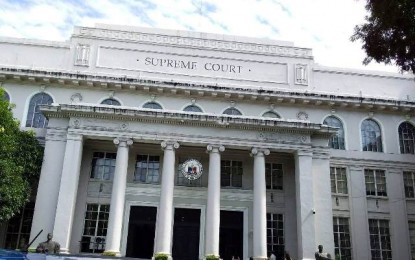
MANILA – Technology is seen to play a significant part in the country's justice system under the 'new normal', a Supreme Court (SC) official said Friday.
“All told, the new normal can be justice is accessible to everyone at all times. We just have to embrace enabling technologies that are reliable, malware-free, and Covid-free,” said Court Administrator Jose Midas Marquez in a webinar hosted by the Judicial Integrity Network in Asean.
For instance, videoconferencing allowed court processes to continue despite the prevailing community quarantine amid the coronavirus disease 2019 (Covid-19) pandemic.
He added that 1,350 trial courts were able to conduct 3,201 videoconferencing hearings which resulted in the release of 22,522 persons deprived of liberty (PDLs) since the start of the enhanced community quarantine on March 17.
A total of 9,731 PDLs were released from March 17 to April 29 while 4,683 PDLs were released from April 30 to May 8. Meanwhile, 4,167 PDLs were released from May 16 to 22.
The SC said 3,941 were released from May 9 to 15 as the country was hit by Typhoon "Ambo" (Vongfong) which prompted the suspension of work in affected areas.
Aside from Marquez, the webinar featured Hon. Sundaresh Menon, Chief Justice of Singapore; Hon. Judge Andriani Nurdin, Vice President of the High Court of Jakarta; Hon. Tan Sri Azahar Mohamed, Chief Judge of Malaya, Malaysia as speakers. The webinar was moderated by (Ret.) Acting Chief Justice and Justice of the Supreme Court of Sri Lanka, Shiranee Tilakawardane.
They acknowledged how judiciaries in affected countries utilized technology so as not to disrupt judicial work and operations to ensure access to justice, transparency, and fair trials especially during this time when physical distancing is strictly being enforced.
Marquez said that 1,000 trial courts were initially authorized to pilot-test the conduct of videoconferencing hearings only on urgent matters in criminal cases involving PDLs.
The Court, however, eventually expanded the coverage of videoconference hearings to “all matters pending before (the courts), in both criminal and civil cases, whether newly-filed or pending and regardless of the stage of trial”.
Some 350 more courts were authorized to conduct videoconferencing hearings bringing the total number to 1,350 courts.
Marquez said the PDLs were released through bail or recognizance, or after serving the minimum imposable penalty for the crime they were charged for.
He added that this not only decongested the country’s jail facilities but also minimized the risk of further spread of Covid-19 infection among inmates. (PNA)
